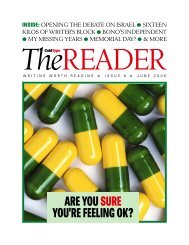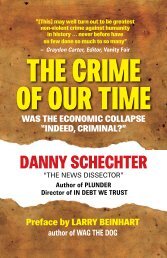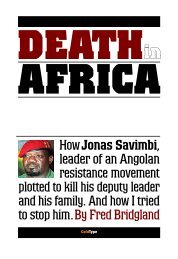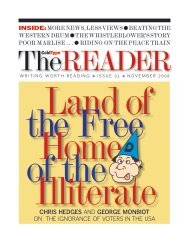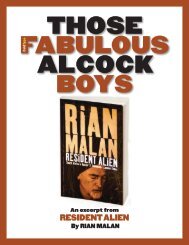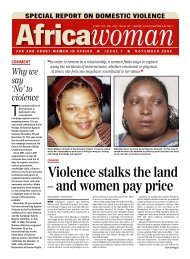Create successful ePaper yourself
Turn your PDF publications into a flip-book with our unique Google optimized e-Paper software.
Radical Middle | 171<br />
piece which I can now see was less mannerly than it should be,<br />
and in Frontline’s small universe the fertiliser hit the fan.<br />
I plunged to sarcasm about whites who claimed Nkosi<br />
Sikelele as their anthem but hadn’t learned the words, so they<br />
stood with mouths opening and closing like goldfish. I also<br />
wondered who was the “Ngawethu” in “amandla Ngawethu”.<br />
The phrase means “Power to us” and I argued that it would<br />
be helpful if there was some reasonable understanding as to<br />
who the “us” was. Did “us” include everybody, the capitalists<br />
and the racists and the Black consciousniks and the dreaded<br />
Gatsha and the lot, all putting their hats in the democratic ring<br />
and letting an outcome flow from the aggregate of interactions?<br />
If it did, then I’d have no trouble with “Power to us”; it’d be<br />
just the ticket. But plenty of people interpreted “Power to us”<br />
as the aNc telling everyone what colour boots to wear, and<br />
plenty of others had the NomaV-ish idea of “Ngawethu” as a<br />
switch of jackboot to the black man’s foot, usually with earnest<br />
promises of benignity. for me there was too much “the” in the<br />
equation. Was I “the whites”? Was my once-a-month gardener<br />
Johannes, “the blacks”? Was my embracing of his citizenship<br />
supposed to mean I abandoned my own? Didn’t work.<br />
To call the amandla slogan into question was sacrilege. To<br />
challenge Nkosi Sikelele was worse, although to anyone who<br />
could see straight I had not disrespected the anthem but only<br />
a segment of its singers. (My kids grew up, very satisfactorily,<br />
with both; two anthems with not a word of english; a bigness<br />
to rejoice in.)<br />
These things were combative, I accept, but the part that got<br />
the most blood boiling was about the raised-fist salute.<br />
While I have no trouble with a white person supporting<br />
black liberation, like a male person supporting feminism,<br />
I don’t know about this salute, which had started as a Black<br />
Power thing and although it has diffused a bit still rings of “this<br />
is our thing.” arms as pale as mine poking the air in a sign of<br />
black pride seemed almost a theft, really, of what wasn’t theirs.<br />
I raised this thought and also, slightly throwaway, touched




